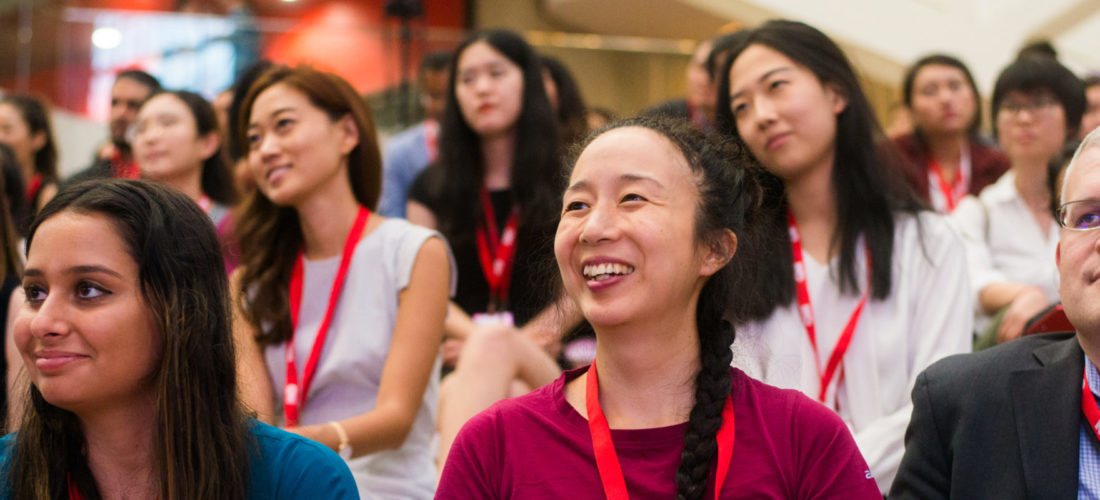
The Asian American Journalists Association (AAJA) is a membership nonprofit advancing diversity in newsrooms and ensuring fair and accurate coverage of communities of color. AAJA has more than 1,500 members across the United States and Asia.
The Asian American Journalists Association is a professional membership association founded in 1981 by a group of AAPI journalists seeking to support one another and to encourage more AAPIs to pursue journalism. Today, we continue to champion the development of AAPI representation and leadership in journalism through trainings, opportunities, and resources for our members as well as through nurturing and maintaining a network and community of AAPI journalists globally.
The heart of AAJA’s four-fold mission is to increase AAPI perspectives and representation
in newsrooms, media, and storytelling. We do so by the following:
- To provide encouragement, information, advice and scholarship assistance to AAPI students who aspire to professional journalism careers.
- To provide to the AAPI community an awareness of news media and an understanding of how to gain fair access.
- To provide a means of association and support among Asian American and Pacific Islander (AAPI) journalists, and to advance AAPI journalists as news managers and media executives.
- To provide a means of association and support among Asian American and Pacific Islander (AAPI) journalists, and to advance AAPI journalists as news managers and media executives.
- To research and point out when news media organizations stray from accuracy and fairness in the coverage of Asian Americans and Pacific Islanders and AAPI issues.
AAJA was founded in 1981 by a small group of AAPI journalists to support one another and to encourage more AAPIs to pursue journalism at a time when there were few AAPI faces in the media.
AAJA owes its founding to the vision of this small group of Los Angeles journalists:, Tritia Toyota and Frank Kwan of KNBC-TV News; Bill Sing, Nancy Yoshihara and David Kishiyama of the Los Angeles Times; and Dwight Chuman of Rafu Shimpo, a local Japanese American newspaper.
In 1985, AAJA became a national organization spanning the United States with the formation of additional chapters beyond Los Angeles. Today, AAJA has more than 1,600 members in 20 chapters across the U.S. and Asia, with its largest membership bases in large metropolitan areas on the West Coast (Los Angeles, San Francisco-Bay Area, and Seattle), East Coast (New York City and Washington, D.C.), and in the Midwest (Chicago).
In addition, AAJA has a growing number of members working throughout Asia — in Tokyo, Hong Kong, Seoul, Singapore, the Philippines and Bangladesh — which underscores the rapid growth of media properties in Asia and points the way to future expansion of the organization.
Close to one-third of AAJA’s members are students, attesting to the organization’s emphasis on bringing young people into the news business.
AAJA is proud to include among its members some of the top journalists in the country, from network news anchors and reporters to Pulitzer Prize-winning writers, editors and photographers, to national radio show producers and major magazine editors.
Since its founding, AAJA has established journalism career development and mentorship programs that prioritize diversity and that continue to evolve as journalism evolves. Over time, AAJA has strengthened its civic engagement arm, which holds newsrooms accountable to accurate reporting on AAPIs (through MediaWatch and AAJA Studio) and trains local and community organizations to engage with the media (Media Access).
AAJA enters a milestone 40th year in 2021. Our mission remains just as urgent as it was in 1981, especially in the shadow of a recession that reduced the number of journalists of color who would have been poised for senior-level roles. AAJA’s programmatic priorities have existed in parallel, but there is an unprecedented opportunity to further coordinate and synthesize our work. Even with programs that cultivate leadership at different stages of a journalist’s career, the “pipeline” problem remains, and will be even further exacerbated by COVID-19’s impact on the industry. AAJA views this pivotal moment as both an opportunity and a challenge to uplift our mission, the work and livelihoods of our members, and our larger AAPI community and communities of color.
